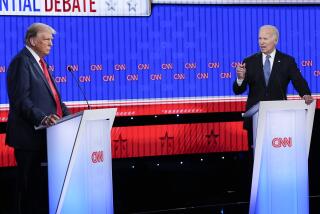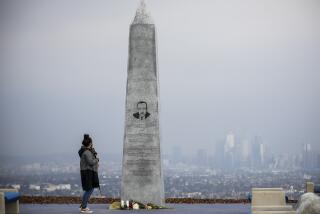Bush, Gore Poles Apart on Earth Day
- Share via
WILMINGTON, N.Y. — In a steady snowfall, President Bush celebrated Earth Day on Monday by visiting the Adirondacks, where he described himself as an ardent environmentalist for whom “every day is Earth Day.”
Reviewing the nation’s “tremendous progress” on the environment since the first Earth Day in 1970, he declared: “This Earth Day finds us on the right path.”
Bush also flatly rejected criticism from environmentalists who say that his “Clear Skies” initiative will do little to curtail power-plant emissions of acid rain-producing sulfur dioxide, smog-causing nitrogen oxide and mercury, which pollutes waterways and works its way up the food chain.
“Under Clear Skies legislation, America will do more to reduce power plant emissions than ever before in our nation’s history,” he said in a speech moved indoors at the last minute because of the unexpected snowfall.
The president’s plan would set a nationwide cap on sulfur dioxide emissions but allow older, dirtier plants to buy “credits” from newer, cleaner plants.
In his own Earth Day remarks, former Vice President Al Gore joined environmentalists in arguing that the current Clean Air Act would strip more pollutants from the air faster than the Bush plan, unless the government is lax in applying existing law.
“What kind of world are we building when parents of Little Leaguers have to be more worried about them catching their breath than catching a fly ball?” Gore said in a speech at Vanderbilt University in Nashville.
Sen. Joseph I. Lieberman (D-Conn.) said one of the biggest shortcomings of Bush’s air pollution proposal was its failure to regulate emissions of carbon dioxide, the major greenhouse gas, from human activities.
“I still hope that the president wakes up and smells the carbon,” said Lieberman, who is sponsoring a bill that would regulate carbon dioxide and the pollutants targeted in Bush’s proposal.
Environmentalists marked Earth Day by criticizing the Bush administration for siding with industries, and against the environment, on everything from making Yucca Mountain a permanent repository for nuclear wastes to reconsidering a ban on snowmobiles in Yellowstone National Park.
But Bush defended his environmental record, highlighting his support for the Land and Water Conservation Fund, which promotes a variety of environmental conservation approaches. He noted that his fiscal year 2003 budget fully funds the conservation fund with more than $900 million for the second consecutive year.
And with gas prices soaring once more amid concerns that conflict in the Middle East could lead to oil shortages, the president renewed his call for independence from foreign sources of energy.
At almost the same time, Gore was delivering his scathing critique of Bush’s environmental record.
“America is only as healthy as the air our children breathe, the water they drink and the Earth they will inherit,” he said. “But instead of embracing the bipartisan national consensus to improve our environment, the Bush administration has chosen to serve the special interests instead of the public interests and subsidize the obsolete, failed approaches of the past, instead of the exciting new solutions of the future.”
In an opinion article in Sunday’s New York Times, the president’s 2000 rival for the White House argued that Bush’s environmental policies “are completely dominated by a group of current and former oil and chemical company executives” determined to resist efforts to clean up the environment.
When asked here about Gore, the president replied: “Hadn’t paid attention to him.” Told that Gore had lambasted Bush’s environmental record, the president added: “That’s why I haven’t paid attention to him.”
Bush spokesman Ari Fleischer discounted Gore’s statements: “I think it has more to do with internal Democratic presidential posturing than it does with any serious assessment of the president’s record on the environment.” Before his speech, Bush strolled along the scenic Ausable River and stopped at several points to help volunteers rebuild a meandering path, wielding a maul and then a hammer.
The 6-million-acre Adirondack Park is considered a model of public-private cooperation in land conservation.
Even as he hailed the park as “good stewardship in action,” Bush added that “the federal government also has a big responsibility--and I understand that.”
But Sen. James M. Jeffords (I-Vt.), chairman of the Senate Environment and Public Works Committee, who has proposed an air pollution bill that would cut emissions faster than Bush’s plan, took issue with the choice of location for the president’s speech.
“It seems a little strange that the president would go to upstate New York to promote his plan,” Jeffords said. “From what I understand, his plan asks the Northeast to wait for decades before biological recovery from acid rain impacts will begin. That’s unfortunate, because I believe we can do it sooner and still cost effectively.”
More to Read
Sign up for Essential California
The most important California stories and recommendations in your inbox every morning.
You may occasionally receive promotional content from the Los Angeles Times.










